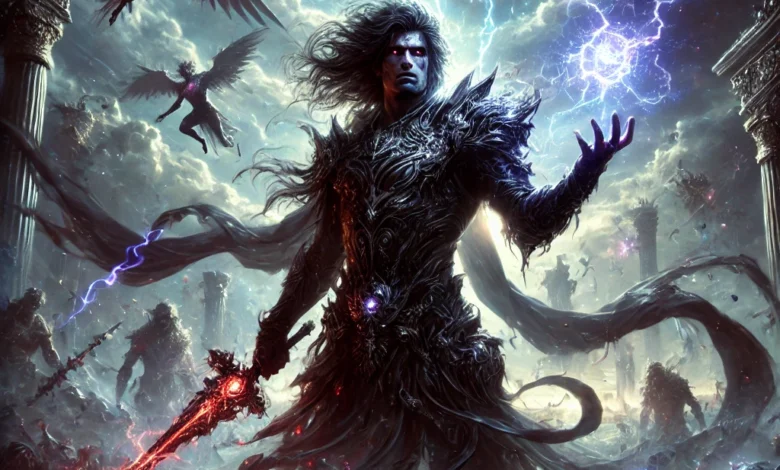The Disowned Child: Chronicles of Unleashed Divine Bloodlust

is a story that plunges readers into a mythological world where gods and mortals coexist, and where betrayal, vengeance, and the thirst for divine power fuel the tragic narrative of a forsaken child. This tale combines elements of fantasy, dark mythology, and the existential struggle for identity and belonging in a world marked by divine violence. At the core of this story is a child who, disowned by the gods, embarks on a journey that leads to the unleashing of unimaginable bloodlust, intertwining fate, revenge, and divinity.
The Divine Origins
The story begins with the birth of a child, born of a forbidden union between a god and a mortal woman. In this ancient world, such unions were not unheard of, but they were always fraught with tension. The gods, though powerful and eternal, were fickle beings who often used mortals for their pleasure and then discarded them. The mortal mother, caught in the passion of a divine encounter, gives birth to a child—part mortal, part divine. However, this child, born out of a moment of transgression, is never accepted by the pantheon of gods.
The father, a god of war and destruction, disowns the child, seeing him as an abomination and a reminder of his fleeting moments of weakness. The gods, known for their egos and desire for purity among their kind, view the child as a taint on their divine lineage. In their eyes, this offspring of a mortal and a god does not deserve to exist. Banished to the mortal realm and stripped of any divine favor, the child grows up as an outcast.
A Life of Suffering
The disowned child, named Kaelon, grows up in a world that constantly reminds him of his otherness. In the human realm, he is seen as a curse, someone to be feared and shunned because of the strange powers that linger within him. Though he does not have the full powers of a god, Kaelon possesses strength, speed, and an unnatural affinity for violence—abilities that make him a target of both envy and fear among mortals.
Kaelon’s upbringing is marked by suffering. He is rejected by society, and his mother, the only person who ever loved him, dies when he is still young, leaving him to navigate a harsh and unforgiving world alone. As Kaelon grows, so too does his anger and resentment. He begins to feel the pull of something darker within him, a divine rage that gnaws at his humanity. The rejection by his divine father and the cruelty of mortals ignite a fire in Kaelon that cannot be quenched.
The Awakening of Divine Bloodlust
As Kaelon enters adulthood, the dormant power in his blood begins to awaken. No longer content to live as an outcast, he decides to seek out the gods who forsook him. His journey is one of both discovery and destruction. Along the way, Kaelon uncovers ancient secrets about his divine heritage. He learns that his father, Atheron, is not just a god of war but also the embodiment of retribution. This knowledge triggers a transformation within Kaelon, one that brings him closer to his divine roots.
With each battle fought and every enemy slain, Kaelon’s divine bloodlust grows stronger. He begins to lose touch with his mortal side, becoming more like the father who disowned him. However, unlike Atheron, Kaelon’s wrath is not controlled; it is unleashed, wild, and uncontrollable. His desire for vengeance against the gods who rejected him and the mortals who mistreated him fuels his actions, leading him down a path of chaos and carnage.
The Quest for Vengeance
Kaelon’s thirst for vengeance leads him to the gates of the divine realm, where he confronts the gods who abandoned him. In his mind, they are responsible for all the suffering he endured, and they must pay for their cruelty. However, the gods do not see Kaelon as a threat. To them, he is still just a half-blood, a being unworthy of their attention. This underestimation of Kaelon’s power proves to be their downfall.
In an epic confrontation, Kaelon unleashes his divine bloodlust on the gods. His rage is unmatched, fueled by years of torment and rejection. As the gods fall one by one, Kaelon begins to realize that his thirst for vengeance cannot be easily satisfied. The more he kills, the more his bloodlust grows. He becomes a force of destruction, a being of pure rage who cannot be stopped.
The Tragic Conclusion
Despite his divine power, Kaelon is still, at his core, a being who craves acceptance and belonging. Yet, as he slaughters the gods, he begins to lose the last vestiges of his humanity. His desire for revenge has consumed him, and he is left with nothing but the ruins of the divine realm and a hollow victory. The gods, once untouchable, are gone, but so too is the part of Kaelon that longed for their approval.
In the end, Kaelon’s story is one of tragedy. He achieves his goal of revenge, but at the cost of his soul. His divine bloodlust, once the source of his strength, becomes his undoing. Alone in a world where both gods and mortals fear him, Kaelon becomes a legend—a cautionary tale of what happens when the desire for vengeance overtakes the desire for redemption.
Themes of Identity, Revenge, and Power
At its heart, The Disowned Child: Chronicles of Unleashed Divine Bloodlust explores themes of identity, belonging, and the destructive nature of revenge. Kaelon’s journey is one of self-discovery, but it is also a warning about the dangers of letting anger and resentment fester unchecked. His transformation from a disowned child to a vengeful god is a reflection of how unchecked power can lead to self-destruction.
The story also delves into the complicated relationship between gods and mortals. In this world, the gods are not benevolent beings but rather flawed and cruel entities who view mortals as playthings. Kaelon’s rejection by both the mortal and divine worlds highlights the struggles of individuals who feel caught between two identities, unable to fully belong to either.
Conclusion
The Disowned Child: Chronicles of Unleashed Divine Bloodlust is a powerful tale that blends mythological elements with deep emotional themes. It is a story of a child abandoned by both worlds—mortal and divine—and the consequences of that abandonment. Kaelon’s descent into divine bloodlust serves as both a cautionary tale and a tragic exploration of the lengths one might go to when seeking revenge and identity in a world that refuses to accept them.



